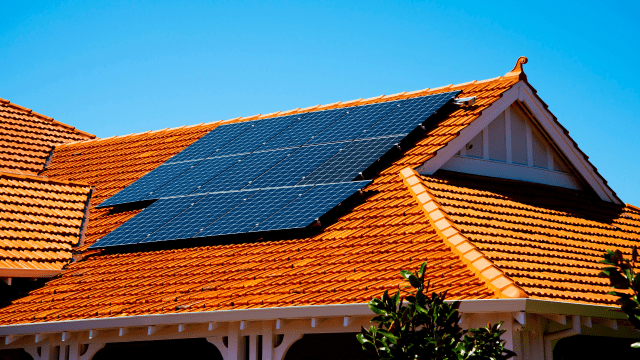Solar panels are one of the most terrific inventions of the past 50 years, capable of harnessing energy from the sun and turning it into electricity. But how do solar panels work?
The original solar panel PV system with 20 per cent efficiency was developed right here in Australia, and we’ve come a long way since first experimenting with the tech. You can now have solar panels fitted to your house to offset your energy bills.
Let’s answer some burning questions about solar panels.
How do solar panels work?
Solar panels generate electricity by harnessing the light produced by the sun. The sunlight that comes into contact with the panels is converted into electricity: photovoltaic cells (which you might know as PV cells) inside the panels generate electrical charges that move around, which is then fed through into your home (after being converted from DC to AC energy).
The power from solar panels can be fed back into the grid to offset your power bill, although you can store the energy for later use with a home battery. Regardless, a meter will check your consumption and production of electricity and your home will use solar power first before relying on grid power (unless disabled).
How much do solar panels cost in Australia?
Depending on the scale of your solar panel setup, the price goes up. Solar Choice has a terrific guide to how much it would cost in each major Australian city, for several different solar panel sizes.
Below is Solar Choice’s October 2022 price estimates for a 7kW system, which is a pretty standard solar system that you’d find on the roofs of homes with solar power. These prices include up-front incentives and GST.
- Adelaide, SA: $5,790
- Brisbane, QLD: $7,090
- Canberra, ACT: $6,260
- Darwin, NT: $10,020
- Hobat, TAS: $7,770
- Melbourne, VIC: $6,320
- Sydney, NSW: $6,000
- Perth, WA: $9,120
How many solar panels do you need to power a house?
For solar panels to work effectively, the system should be reflective of the power use of your home. You don’t want to be producing less energy than you’re consuming, although it wouldn’t hurt to have solar panels, as you’d still benefit from their energy production.
According to Choice, a 5kW system is adequate for most homes, but it’s less a measure of how many panels and more a measure of how many kilowatts (kW). A 24 panel system comprised of 275cm solar panels, for example, would be able to produce about 6.6kW, ample for most homes.
Just keep in mind that you’d need the roof space. Solar panels take up a lot of room.
Should I add a battery to my solar system?
If you’d like to use more of the solar energy that you produce and rely less on the grid, a battery can help you tap into it overnight when the sun isn’t shining, by leveraging stored energy that your panels have produced during the day. Solar batteries typically cost between $800 and $2,000 depending on the kilowatt capacity. You don’t need a battery for your solar panels to work, however.
How long do solar panels last for?
Solar panels generally have a working life span of about 25 years, according to Skyline Solar, however, their effectiveness can drop over time. To maximise their use over this time, make sure you’re properly maintaining them (ie, they need to be cleaned). This will also improve how well the solar panels work and cut down on performance drop over time.
Additionally, cheaper, lower-quality solar panels may not work as long as more expensive ones, so it’s best to shop around and compare models.
How do I clean my solar panels?
You can hire expert cleaners online, like with most home cleaning jobs, but if you’d like to do it yourself, Shoalhaven Solar recommends using water and a soft, non-abrasive cloth or sponge to wipe away debris. To avoid leaving residue behind, use a squeegee or a chamois after the initial clean. Don’t use any soap stronger than detergent, and only use soap if you need to.
What are the disadvantages of solar energy?
While solar energy can reduce your power bill, it’s worthwhile going over any potential disadvantages, depending on your living situation.
Firstly, they’re a permanent fixture to the roof, which basically rules them out for renters, unless you’ve got some special arrangement with your landlord and real estate. If you’re not a renter, you’ll need to be sure that the panels are being placed on a part of the roof that doesn’t annoy you. If you end up disliking the panel position on the roof and would like it moved, this could rack up costs.
Which is another big problem: the cost. Earlier, we wrote that a 7kW solar panel system in Sydney would cost the homeowner about $6,000, which although not a ludicrous amount, is still quite an expensive purchase. Keep in mind that this is before paying a professional to install the system and before the purchase and installation of a battery (which may add between $800 and $2,000 to your bill).
This cost is alleviated by the fact that you won’t be paying such big energy bills, but it is a high entry price.
Finally, know that solar energy is weather-dependent, in that efficiency is limited in cloudy weather and non-existent at night time, as there is no sunlight to harness. While this isn’t a problem for most of Australia, as there’s lots of sun to go around, it’s something to keep in mind if you’re confused by a suspiciously high power bill after a cloudy month.
This article is intended as an explainer of how solar panels work, not buying advice. Before you purchase solar panels, make sure they’re the right choice for your house and lifestyle.

Comments